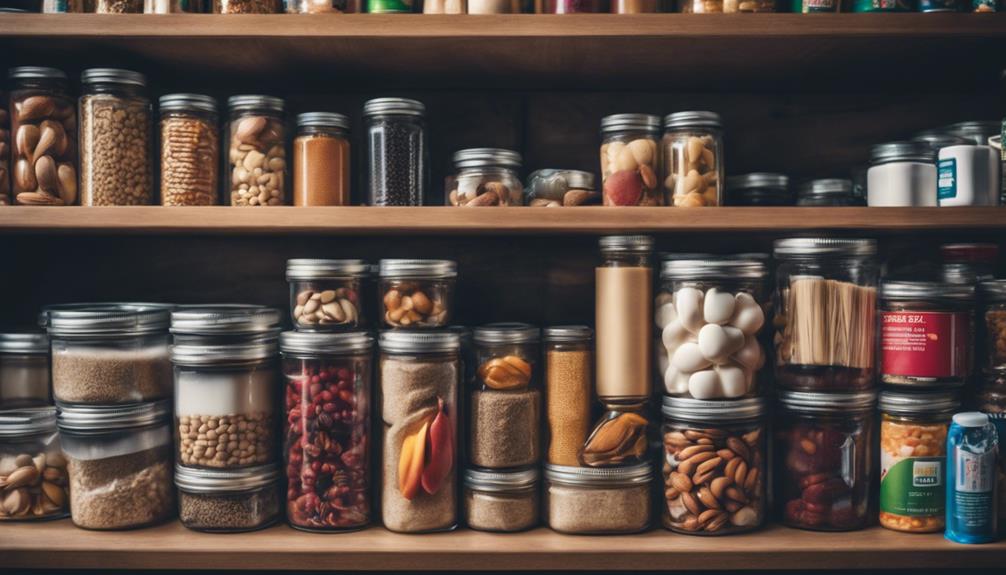Stockpile essential foods like grains (rice, pasta), protein-rich beans (black, pinto, chickpeas), healthy fats (avocado, nuts), flavorful spices (salt, garlic powder), and versatile baking supplies (flour, sugar). Guarantee a balanced, nutritious stockpile for emergencies with long shelf life items. These provide sustenance, energy, and flavor during crises. Having diverse food options aids in maintaining health and strength in challenging situations. Keep your pantry well-prepared with these key staples for your survival needs. For a detailed guide on the best items to stockpile for emergencies, continue exploring essential foods suggested for preppers. Don’t forget to include canned vegetables and fruits, which provide important vitamins and additional fiber, as well as shelf-stable dairy or plant-based milk for calcium. Dried or canned meats like tuna, chicken, and beef can also be part of a well-rounded pantry. Preppers essential stockpile items should balance long-term nutrition with variety, ensuring that you can create simple, satisfying meals even in difficult situations.
Key Takeaways
- Stock up on essential grains like rice, pasta, oats, and quinoa for long-lasting nutrition.
- Include protein-rich beans such as black beans, chickpeas, and more for plant-based sustenance.
- Incorporate healthy fats like avocados, nuts, and olive oil for energy and nutrient absorption.
- Spice up your pantry with flavorful options like salt, pepper, and garlic powder for enhanced taste.
- Store versatile baking supplies such as flour, sugar, and baking powder for emergency baking needs.
Essential Grains
Stocking up on essential grains like rice, pasta, oats, and quinoa is crucial for preppers due to their long shelf life and nutritional value. These grains are the backbone of a well-prepared prepper pantry, offering sustenance and energy during times of need. With their extended shelf life when stored properly, grains provide a reliable food source that can last for years, making them indispensable for emergency situations.
Incorporating a variety of grains into your prepper pantry guarantees a diverse and balanced diet, essential for maintaining health and strength. Rice is a versatile staple that pairs well with many dishes, while pasta isn't only comforting but also easy to prepare.
Oats offer a hearty breakfast option packed with fiber, and quinoa stands out for being a complete protein source.
Protein-Rich Beans

Incorporating protein-rich beans into your prepper pantry is essential for ensuring a balanced diet and long-term sustenance. Beans like black beans, pinto beans, kidney beans, and chickpeas are excellent sources of plant-based protein, offering versatility in meal preparation during emergencies.
Canned beans, with their extended shelf life, are convenient for food storage in survival situations. Besides protein, beans are rich in fiber, vitamins, and minerals, promoting overall health and nutrition. By including beans in your emergency food storage, you aren't only stocking up on essential nutrients but also ensuring you have the energy needed for survival.
Whether you choose to cook them from dried beans or opt for the convenience of canned varieties, having protein-rich beans readily available in your prepper pantry is a smart choice for long-term sustenance during challenging times.
Healthy Fats

When considering your prepper pantry, don't overlook the importance of incorporating healthy fats for peak nutrition and sustained energy levels. Healthy fats are vital for various bodily functions, including energy production, nutrient absorption, and cell health.
Sources like avocados, nuts, seeds, olive oil, and fatty fish such as salmon are excellent choices to stockpile in your survival pantry. These foods provide monounsaturated and polyunsaturated fats, known as 'good' fats that can benefit heart health.
Including healthy fats in your emergency food supply not only adds essential nutrients but also helps promote satiety, support brain function, and reduce inflammation.
When selecting items for your pantry, consider the shelf life of these foods. Opt for items like nuts and seeds that have a longer shelf life, or even freeze-dried options for extended storage.
Balancing your intake of healthy fats with other essential nutrients is critical for maintaining a well-rounded diet that can sustain you during challenging times.
Flavorful Spices

Don't underestimate the impact of flavorful spices in enhancing the taste and nutritional value of your prepper pantry supplies.
Common spices like salt, pepper, garlic powder, onion powder, and paprika not only add zest to your meals but also offer health benefits.
The beauty of spices lies in their long shelf life, making them perfect for long-term storage in your emergency food supply.
Versatile Baking Supplies

To diversify your prepper pantry and enhance your baking options, consider incorporating versatile baking supplies that offer flexibility and longevity in your emergency food storage.
Proper storage techniques play an essential role in extending the shelf life of baking supplies. Utilizing airtight containers, brown paper bags, oxygen absorbers, Mylar bags, and silica gel packs can help maintain the freshness of essential baking ingredients.
Exploring alternative items like arrowroot powder can add variety and versatility to your baking recipes. Educational resources are available to guide you on effectively storing and utilizing baking supplies for long-term storage.
Storing these essentials in airtight containers in the refrigerator or freezer can further preserve their quality and freshness. By stocking up on these versatile baking supplies and ensuring they're stored properly, you can be well-prepared to whip up delicious baked goods even in emergency situations.
Make sure to rotate your supplies regularly and consider including baking essentials in your first aid kit for added convenience.
Nutritious Fruits and Veggies

When it comes to prepping, incorporating essential produce choices like canned fruits and vegetables can provide a vital source of vitamins and minerals.
Long-term storage tips for dried fruits and pickled veggies offer lightweight and tangy options to keep in your pantry.
Additionally, considering the possibility of growing your own fruits and vegetables can guarantee a sustainable source of fresh produce during emergencies.
Essential Produce Choices
Including a variety of nutritious fruits and vegetables in your prepper pantry is essential for maintaining a well-rounded diet during emergencies.
Canned fruits like peaches and pears, common in the United States, retain essential nutrients and can last up to 2 years, providing a reliable source of vitamins.
Dried fruits such as raisins and apricots are nutrient-dense, offering fiber and antioxidants in a compact form.
Pickled vegetables like cucumbers and carrots not only add crunch but also introduce probiotics for gut health.
Shelf-stable tomato products like diced tomatoes and tomato sauce are versatile staples that can be used in a variety of dishes like soups, stews, and pasta.
To extend the shelf life of these produce choices, consider storing them in mylar bags, ensuring they remain fresh and ready for consumption when needed.
Long-Term Storage Tips
Proper storage conditions play an essential role in preserving the quality and nutritional value of your nutritious fruits and vegetables for long-term consumption.
To make sure you have enough food for an extended period, consider the following tips:
- Use Oxygen Absorbers: When storing dried fruits and vegetables, consider adding oxygen absorbers to the containers. This helps in reducing the oxygen levels inside the packaging, extending the shelf life of the items.
- Rotate Stock: Make sure to rotate your canned and pickled fruits and vegetables regularly. By using the older items first and replenishing your stock, you can maintain a fresh supply of nutritious options.
- Check Expiry Dates: Keep track of the expiration dates on canned and pickled items. Consuming them before they expire ensures you have a variety of long-lasting foods available for emergencies.
Growing Your Own
How can you guarantee a sustainable food source in times of need while promoting overall health and immunity? By growing your own nutritious fruits and vegetables, you can achieve just that.
Home-grown produce not only offers a sustainable food source but is also rich in essential vitamins, minerals, and antioxidants that support your overall well-being. Cultivating a variety of fruits and vegetables ensures a diverse and balanced diet, providing ideal nutrition for you and your loved ones.
In addition to the health benefits, gardening can be a cost-effective way to supplement your prepper pantry with fresh, organic produce. Understanding the growing seasons and requirements of different fruits and vegetables is key to maximizing your yield and food supply.
Frequently Asked Questions
What Are the Best Foods to Stockpile for Survival?
When preparing for survival, focus on stocking up on canned goods, grains, protein sources, and dairy alternatives. These items offer essential nutrients, energy, and versatility. Don't forget snacks like nuts and granola bars for quick sustenance and variety.
What Food Is Good for Preppers Long Term Storage?
For preppers looking for long-term storage options, consider stocking up on grains, canned goods, dried fruits, dairy alternatives, and nutrient-dense snacks. These items provide essential nutrients, have a long shelf life, and are easy to store in your pantry.
What Is the Number One Survival Food?
When it comes to survival, the number one food to stockpile is canned goods. They offer long shelf life and essential nutrients. Versatile and easy to store, canned goods like fruits, vegetables, meats, and soups are ideal for emergencies.
What Food Can Be Kept for Hundreds of Years Without Spoiling?
You can store white rice in a cool, dry place with oxygen absorbers to last for hundreds of years due to its low moisture content and resistant outer hull, making it a long-lasting survival food.
Conclusion
In summary, stocking up on essential grains, protein-rich beans, healthy fats, flavorful spices, versatile baking supplies, and nutritious fruits and veggies is crucial for preppers.
By having a well-rounded selection of these items in your pantry, you can guarantee that you have a variety of nutritious and tasty options available in times of need.
So, make sure to keep your stockpile diverse and well-stocked for any situation that may arise.
Happy prepping!










